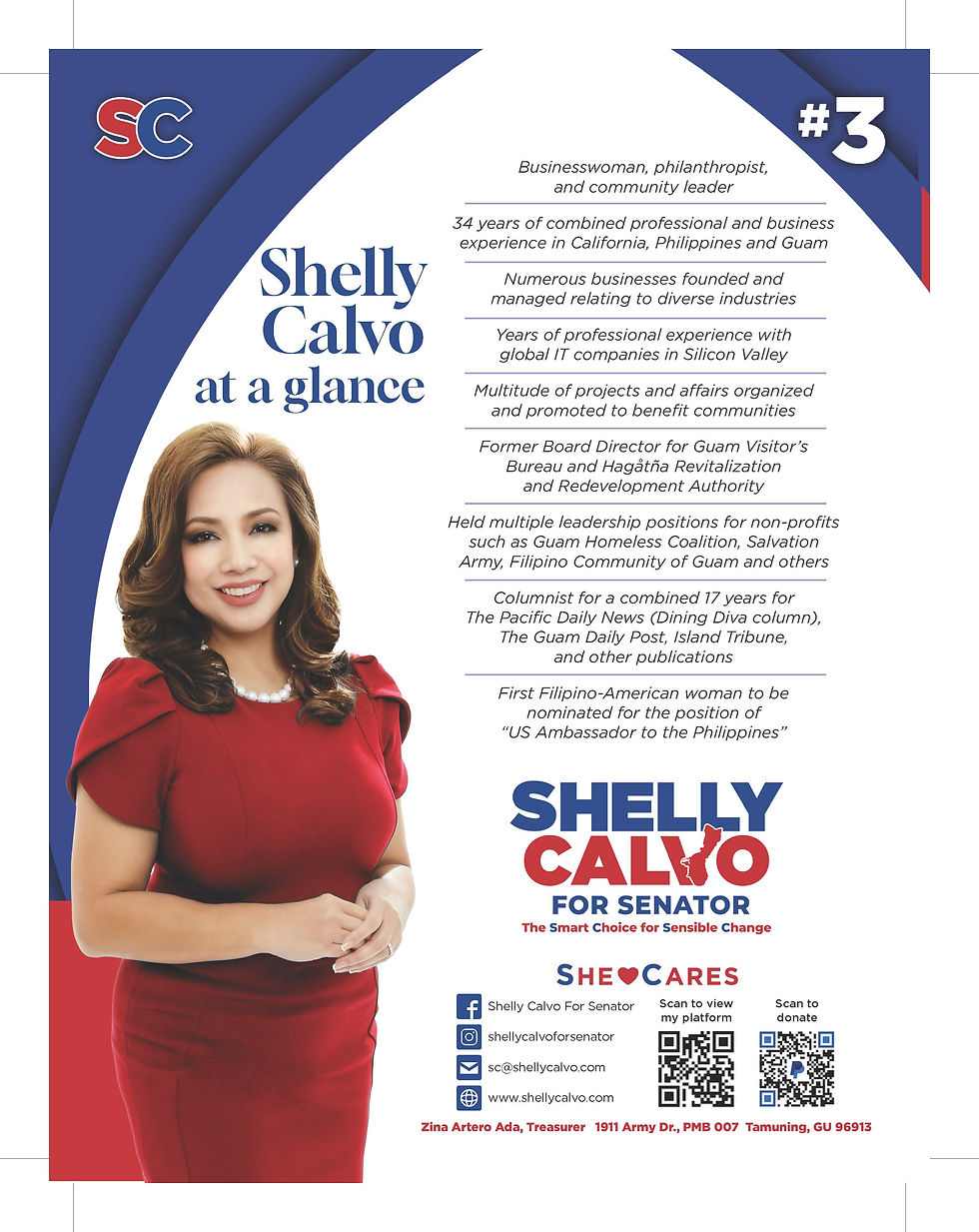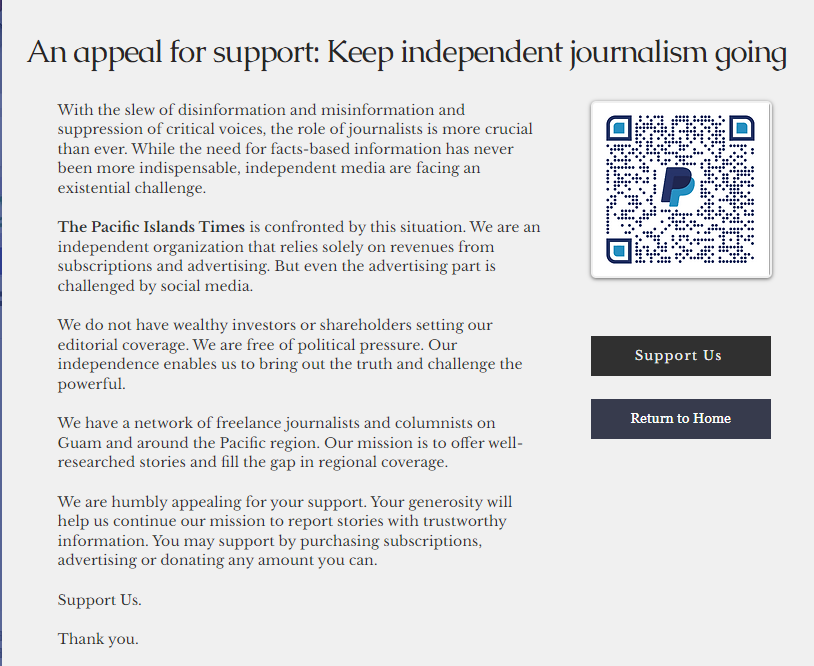
By Mar-Vic Cagurangan
Guam Del. James Moylan slammed his Democratic opponent Ginger Cruz last week, accusing her of making a “deceptive” claim of endorsement by a South Korean ambassador, using a “selfie” taken during a chance meeting at the Democratic National Convention.
Cruz later apologized to Ambassador Hyundong Cho, claiming that the photo's inclusion in a newspaper ad “mistakenly labeled under endorsements" was an "honest mistake."
The ambassador did not endorse Cruz, hence one less endorser in her tally.
Hoping to clinch every vote possible, Guam candidates keep score of endorsements they get from political bigwigs.
They fill the gaps in your time on social media, where incumbent leaders, former elected officials and other self-proclaimed kingmakers act as cheerleaders for the candidates they carry over their shoulders.'
“An endorsement from a person of credibility acts as a permission structure, saying ‘it’s OK to give this person a look,’” said Carlo Branch, former executive director of the Democratic Party of Guam.
Given that fundraising “is exceedingly hard these days,” Branch noted that an endorsement from “known political winners signals high-level donors that you are a good bet.”
Moylan's endorsers include his colleagues in Congress such as House Speaker Mike Johnson, Majority Leader Steve Scalise, Majority Whip Tom Emmer, Conference Chairwoman Elise Stefanik, and Rep. Richard Hudson, chairman of the National Republican Congressional Committee.
The typically fractured Democratic Party of Guam rallies behind Cruz, who listed Gov. Lou Leon Guerrero, Lt. Gov. Josh Tenorio, former governor Carl Gutierrez, former congressmen Robert Underwood and Mike San Nicolas, and U.S. Sen. Mazie Hirono among her endorsers.
“In the most obvious cases, some politicians build a base of support over a lifetime. That base is so loyal; it’s like a family of political faith—a flock,” Branch said. “And the only way to get the flock is to convince the shepherd. In that case, it matters but those politicians are rare.”
ADVERTISEMENT
Guam voters are heading to the polls on Nov. 5 to pick a congressional delegate, 15 senators, mayors, commissioners of the Consolidated Commission on Utilities and members of the Guam Board of Education. As far as they are concerned, who’s endorsing whom does not carry weight when they mark the ballot.
“No,” Yigo resident Roma Kohn replied when asked if she is swayed by political endorsements. Kohn said she votes based on “the track record of candidates.”
“For me, it does not (matter),” said Nanette Senior of Maina. “The real turn-off for me is when politicians spend too much time bringing up dirt on opponents rather than talking about their platform,” she said.
“I am only swayed by endorsements for products and services (not candidates), accompanied by large stats and five stars," Sam Mabini, a former senator, quipped.
“Generally speaking, it does not move the needle for me if it is from a former politician,” said Cesar Cabot, former legal counsel for the Guam Election Commission. “It is somewhat persuasive if it is an endorsement from a professional or civic organization.”
Other than the Guam Association of Realtors, local business and professional organizations rarely endorse candidates during elections.
This year, the realtors’ group has endorsed Moylan’s reelection bid, along with seven Republicans and five Democrats running for the 38th Guam Legislature.

The Guam Chamber of Commerce has issued a general advisory, urging voters to pick candidates “who will reduce the size of government, improve its efficiency, and lower the burden on residents and businesses alike. Let’s elect leaders who will fight for the real issues that matter to us.”
The Guam Women’s Chamber of Commerce, while not directly endorsing candidates, has listed six bills it deemed critical and relevant to the women's sector, and named their proponents in the 37th Guam Legislature.
Just the same, Branch believes that securing bloc endorsements can serve a candidate well.
“For instance, if my base voters are GovGuam employees with kids who are CHamoru, I may not have access to those who identify as Filipino or some other ethnicity working in other sectors,” he said.
“In most cases, an endorsement may not move thousands of votes but it gives you access to crowds you may not have an entrée,” Branch said.
In the end, making the right choice— without relying on information shortcuts and being swayed by popular trends—is every voter’s responsibility, said Julius Sotomayor of Dededo.
“Getting endorsements as a part of a political campaign is like what ‘cool’ people do in high school. They tell other people who they think are ‘cool’ so that those people will start believing they are ‘cool,’” said Sotomayor, an art teacher.
“It’s our active responsibility as voters to find out more about candidates by doing our research, asking the right questions and talking to the right people,” he added.
In a small community where everyone forms part of Guam’s social mesh, the characteristic familiarity between candidates and voters may render endorsements irrelevant.
“Endorsements are superficial and edited. Political ads, billboards and slogans do not influence me," said Gina T. Reilly, a freelance journalist and resident of Barrigada.
"I vote for candidates based on my personal observations, interactions with them and knowledge of their capability I happen to know a lot of politicians personally. Even if they’re my friends, if I know they are not qualified for the job, I will not vote for them," she added.
See the list of candidates here.





Comments